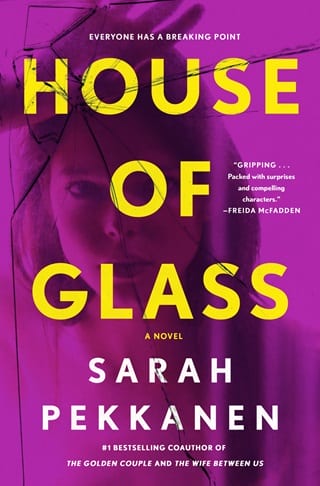Chapter Twenty-Two
CHAPTER TWENTY-TWO
I desperately need to recalibrate my mindset.
As soon as dawn breaks, I lace up my sneakers and go for a punishing four-mile run along the Capital Crescent Trail. A healthy breakfast of blueberries and walnuts mixed into steel-cut oatmeal further centers me. And while I clean my kitchen and do two loads of laundry, I blast my favorite classic rock playlist. By the time I've finished scheduling a contractor to install my new front door, the traumas of my past have been driven back into their compartments—even though the latch holding them no longer feels as secure.
I'm ready to turn my attention to work. My mission has never wavered: I must help my client.
But the kind of help Rose requires may take a different form than I originally anticipated.
Here's what I know about Rose's parents: They love their daughter. And they both lied to project a certain image onto Rose, as if they were superimposing a pleasing hologram over her. They're casting Rose as a victim who was temporarily taken out of school to aid her healing process.
Here's what I know about Harriet Barclay: She's very protective over her granddaughter. And she either unwittingly or deliberately lied about Rose never going into Tina's third-floor quarters. She also provided an alibi for Rose at the time of Tina's death.
There's one other person who has firsthand knowledge about the moments leading up to Tina's death: the friend who was on the phone with her. I have the feeling Detective Garcia was so forthcoming because she wants me to keep digging. She dangled that tidbit because she knows I'm in a unique position to get information from Ian and Beth that the police can't.
Detective Garcia wouldn't give up the name of Tina's friend. But I know someone who may.
So I text Pete, the boyfriend: Can we talk?
He replies immediately: Why?
I cast the line I hope will reel him in: If you're doing parkour today, I can meet you at Gateway.
I imagine him staring down at his screen, surprise swelling in him.
I don't give him a chance to ask how I know about his new hobby. I quickly type: It's my job to investigate people. I'm good at it. And I want to find out what really happened to Tina.
The clues were all there in Pete's car: the new-looking shoes without laces, the thin gloves, the T-shirt logo of a guy jumping over a park bench, and Pete's fresh scrapes and bruises.
I recognized them because one of my former clients took parkour classes at a gym in Rockville. Once, I watched as he leapt, flipped, rolled, and jumped over man-made obstacles. But I figured Pete must be using natural obstacles like flights of stairs, without thick safety pads or harnesses, given his injuries. And the most popular place for outdoor parkour in the area is Gateway Park.
My gamble pays off. I don't even have to leave my house to get the information I need. Pete offers it up willingly a moment later.
Ashley Brown, a twenty-five-year-old Bethesda resident, is the friend Tina was talking to just before she died.
She's the secret police witness.
 Fullepub
Fullepub 



